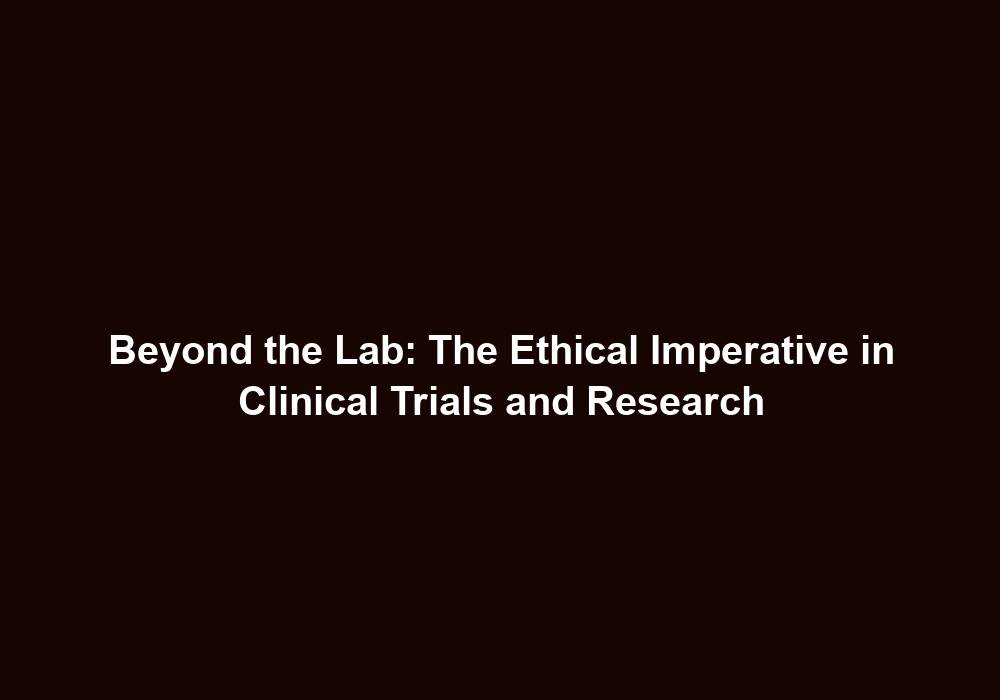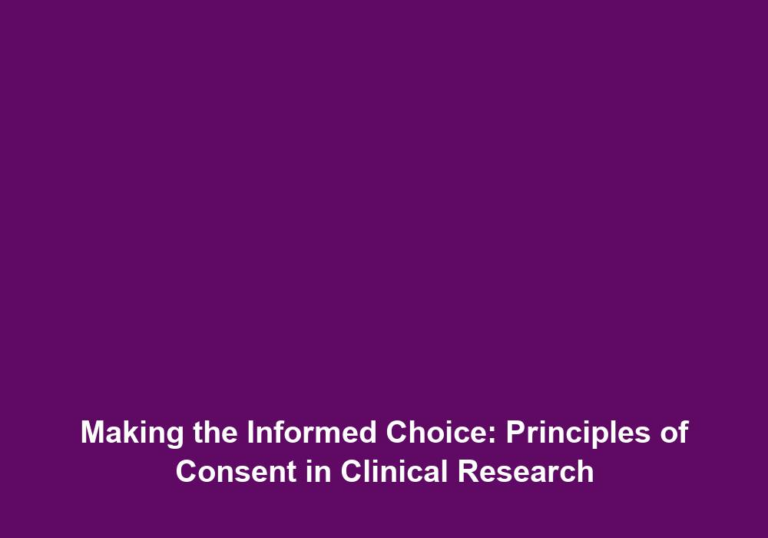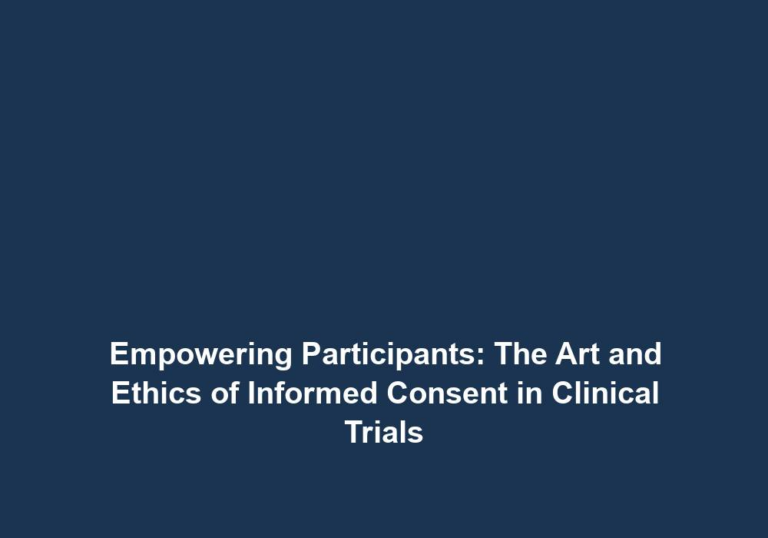Beyond the Lab: The Ethical Imperative in Clinical Trials and Research
Clinical trials and research play a crucial role in advancing medical knowledge, developing new treatments, and improving patient care. However, the ethical implications of these trials must be carefully considered to ensure the protection of human subjects and uphold moral principles. In this article, we will explore the ethical imperative in clinical trials and research, going beyond the lab to discuss the importance of informed consent, patient safety, and the equitable distribution of benefits.
Informed Consent: Empowering Participants and Ensuring Autonomy
Informed consent is the cornerstone of ethical clinical trials and research. It is a process through which potential participants are provided with all the necessary information about the study, including its purpose, potential risks and benefits, and alternatives. They are then given the opportunity to freely decide whether or not to participate, without any coercion or pressure.
Researchers have a moral obligation to obtain informed consent from all participants before involving them in any study. This ensures that individuals fully understand the nature of the research they are being asked to participate in and can make an autonomous decision. Informed consent empowers participants, giving them control over their own bodies and health.
Expanding on this, the process of obtaining informed consent should involve a comprehensive discussion between the researcher and the participant. This conversation should cover the purpose of the study, the procedures involved, the potential risks and benefits, any alternative treatment options, and the participant’s rights regarding confidentiality and withdrawal from the study. Providing this detailed information allows participants to make an informed decision based on their own values and preferences.
Furthermore, informed consent should be an ongoing process rather than a one-time event. Throughout the course of the study, researchers should communicate any changes or new findings that may affect the participant’s decision to continue. This ensures that participants remain fully informed and have the opportunity to re-evaluate their involvement if necessary.
In addition to verbal explanations, written consent forms should be provided to participants. These forms should be written in clear and understandable language, avoiding technical jargon that may confuse or intimidate participants. The consent forms should also outline the participant’s rights, including the right to withdraw from the study at any time without consequence.
Protecting Patient Safety: Minimizing Risks and Maximizing Benefits
The ethical imperative in clinical trials and research goes beyond obtaining informed consent. Researchers must prioritize patient safety throughout the entire process. Rigorous protocols and guidelines are put in place to minimize risks and protect participants from harm.
Before a study can even begin, it must undergo a stringent ethical review by an institutional review board (IRB) or an ethics committee. These bodies carefully evaluate the study design, potential risks, and benefits, ensuring that the research is scientifically sound and ethically acceptable.
During the trial, researchers closely monitor participants to identify any adverse effects or unexpected outcomes. If any risks emerge, the study may be modified or even terminated to protect the well-being of the subjects. Patient safety should never be compromised for the sake of scientific advancement.
In order to minimize risks, researchers must also consider the qualifications and experience of the individuals conducting the study. They should have the necessary expertise and training to ensure that the procedures are conducted safely and accurately. Additionally, the research team should have a plan in place to address any emergencies or complications that may arise during the study.
Moreover, participants should be made aware of any potential risks associated with the study and provided with appropriate resources for support and follow-up care. This includes ensuring that participants have access to medical professionals who can address any health concerns that may arise during or after their participation in the study.
To maximize benefits, researchers should strive to design studies that have the potential to produce meaningful and relevant results. They should carefully consider the research question or hypothesis and ensure that the study design is robust and capable of generating reliable data. By doing so, researchers can contribute to the advancement of medical knowledge and the development of effective treatments.
Balancing Universalism and Particularism: Equitable Distribution of Benefits
Clinical trials and research often involve diverse populations, and it is essential to ensure that the benefits of these studies are distributed equitably. The ethical imperative demands that the benefits derived from research are shared fairly among participants and the broader community.
Universalism refers to the principle that the benefits of research should be universally applicable and accessible to all, regardless of race, ethnicity, socioeconomic status, or geographic location. Particularism, on the other hand, recognizes that certain groups may be disproportionately affected by certain diseases or conditions. It aims to ensure that these populations are not left behind in the research process.
Striking a balance between universalism and particularism requires careful consideration. Researchers must actively involve diverse populations in clinical trials, ensuring that their specific needs and concerns are taken into account. This can be achieved by recruiting participants from different demographic groups and providing culturally sensitive and linguistically appropriate information about the study.
Additionally, mechanisms should be in place to make the resulting treatments and interventions accessible and affordable to all, regardless of their background or circumstances. This may involve working with policymakers, healthcare providers, and other stakeholders to develop strategies for equitable distribution and access.
Furthermore, researchers should consider the potential impact of their research on marginalized communities and strive to address health disparities and inequalities. This may involve conducting studies that specifically target underrepresented populations or collaborating with community organizations to ensure that the benefits of research reach those who need them the most.
By actively promoting diversity and inclusivity in clinical trials and research, researchers can contribute to a more equitable healthcare system that values and respects the needs of all individuals.
Ethical Challenges and Regulatory Frameworks
While ethical guidelines and regulations exist to safeguard the rights and welfare of participants, ethical challenges can still arise in clinical trials and research. Some of these challenges include conflicts of interest, privacy concerns, and the use of placebo controls.
Conflicts of interest may arise when researchers have financial or professional ties to the pharmaceutical industry or other stakeholders. Such conflicts can compromise the integrity of the research and raise questions about the objectivity of the results. Transparency and disclosure of potential conflicts are crucial to maintaining trust and credibility in the scientific community.
To address conflicts of interest, researchers should adhere to strict disclosure and transparency policies. They should disclose any financial or professional relationships that could potentially influence the outcome of the study. This allows participants, regulatory bodies, and the wider scientific community to assess the potential biases and make informed judgments about the validity of the research.
Privacy concerns arise when collecting and storing sensitive personal data. Researchers must ensure that participants’ privacy is protected and that data is stored securely. Anonymization and informed consent for data sharing are important measures to safeguard privacy in the digital age.
When collecting personal data, researchers should use secure methods to store and transmit the information. This may involve using encryption technology, restricting access to authorized personnel only, and implementing data protection protocols in accordance with relevant privacy laws and regulations.
The use of placebo controls, while sometimes necessary for scientific validity, raises ethical concerns. Placebos are typically used when no proven treatment exists, but this means that some study participants may receive a placebo instead of an active treatment. Ensuring that the use of placebo controls is justified and that participants are not subjected to unnecessary harm is essential.
To address ethical concerns related to placebo controls, researchers should carefully consider the ethical implications of using placebos in their study design. They should evaluate whether it is ethically justifiable to withhold an active treatment from participants and explore alternative study designs that minimize the use of placebos whenever possible.
Regulatory frameworks, such as the Good Clinical Practice (GCP) guidelines, provide a framework for ethical conduct in clinical trials and research. These guidelines outline the responsibilities of researchers, sponsors, and regulatory authorities to ensure the protection of human subjects and the integrity of the research.
Researchers should familiarize themselves with the relevant regulatory frameworks and adhere to their guidelines and standards. This includes obtaining the necessary approvals and permissions before conducting the study, maintaining accurate and complete records, and reporting any adverse events or deviations from the protocol as required by regulatory bodies.
Conclusion
Beyond the lab, the ethical imperative in clinical trials and research is of paramount importance. Informed consent, patient safety, and the equitable distribution of benefits are fundamental principles that must guide the conduct of research. By upholding these ethical standards, we can ensure that clinical trials and research contribute to the advancement of medical knowledge while respecting the rights and welfare of human subjects.







